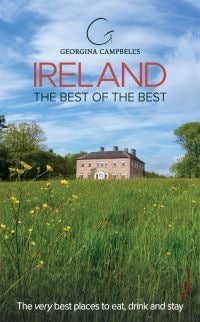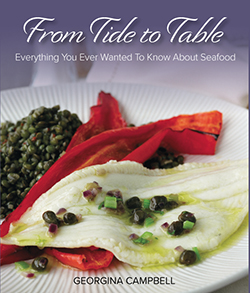The Darina Allen Column
.jpg) This month Darina talks about sustainability, practical life skills including cookery in schools - and how we can all make a difference by thinking about every item that we put into our shopping baskets…
This month Darina talks about sustainability, practical life skills including cookery in schools - and how we can all make a difference by thinking about every item that we put into our shopping baskets…
For many of us the word sustainability is confusing and has many interpretations. A loose definition of Sustainable Agriculture might be: “Farming in sustainable ways which meet society’s present food requirements without damaging the environment or compromising the ability for current or future generations to meet their needs.”
The past weeks have, amongst many other things, given us a badly needed opportunity to press the Pause Button in our busy lives. I suppose it must be my imagination that spring and early summer 2020 was the most beautiful ever. The birds are singing their little hearts out to cheer us up....everything on the farm and in the gardens is green, vibrant and blossoming. Mother Nature seems to be compensating for our misery and despair and reminding us that, given half a chance, she will provide abundance for us. Even in this short time, changes in human behaviour have benefitted the planet - quieter skies, clearer water, cleaner air, healthier nature, bird and insect populations increasing...
We can't stay in 'lockdown' forever but we now know that we can make massive, rapid changes when we adapt the ways we work and live. When this terrible pandemic is over, we have a chance to change our behaviour to offer a secure future, and survivable temperatures, to our children and grandchildren, and we MUST do it. For years now we have heard and largely ignored the predictions of scientists and climatologists. We could scarcely comprehend the scale of the threat to the planet and future generations....even if we could absorb the seriousness of the situation, many felt helpless. It was virtually impossible to believe that governments and vested interests would 'step up to the plate' to implement the changes that needed to be made. Nothing but the Covid19 enforced change could have achieved so much in such a short time. The pandemic should not have come as such a surprise, something of this magnitude was predicted over and over again, not least by Nostradamus, in Aboriginal Lore and by scientists, yet many Governments failed to listen and prepare.
As the planet became more and more polluted, causing almost irreversible climate change, extreme weather conditions - floods, tornados, cyclones, hurricanes.... We were too distracted and obsessed by growth at any price to notice. Food became increasingly less nourishing, compromising our health and immune systems, so we are less and less able to survive the increasing number of viruses that are challenging our systems.
I know I'm like a broken record but surely it must now be beyond obvious that there is an urgent need to re-imbed practical cooking and other life skills, including growing food, into the national and secondary school curriculum. No Irish child, boy or girl, must ever again be awarded a Leaving Certificate without being able to prove they can cook for themselves. Otherwise, we are undeniably failing in our duty of care to our young people, as many helpless 20, 30 and 40 year olds have realised to their cost in the past couple of months.
So how do we practise sustainability in our everyday lives? Once we start to think that way there are a myriad of opportunities. We can make a huge contribution in the way we choose to spend our food euro. Think about each and every item we put into our shopping baskets – really focus on supporting local producers and small businesses as much as possible.
Let's ask ourselves a few basic questions:
• Is it in season?
• Does its production damage the environment?
• Is it properly nourishing?
• Are the producers being paid a fair price?
• How about animal welfare?
• Packaging....?
• After all that, am I buying more than I need? Let's work towards zero waste in every aspect of our lives.
Start to grow some of our own food, even if it's just a few salad leaves on a windowsill – you can't imagine the joy and satisfaction...Realise that it's worth paying a little more for chemical-free food – after all it's surely better to be proactive and invest in our food as medicine rather than paying for meds and food supplements - let's be proactive.
Make your own bread - few things give more satisfaction. Here's another super simple recipe that you and your family will enjoy making and eating together.
BASIC BROWN SODA BREAD
This is a more modern version of Soda Bread, couldn't be simpler, just mix and pour into a well-greased tin. This bread keeps very well for several days and is also great toasted.
Makes 1 loaf or 3 small loaves
[1 loaf tin 23x12.5cm (9x5x2in) OR 3 small loaf tins 14.6cmx7.62cm (5.75inx3in)]
400g (14oz) stone ground wholemeal flour
75g (3oz) white flour, preferably unbleached
1 teaspoon salt
1 level teaspoon bread soda, sieved (Bicarbonate of Soda/Baking Soda)
1 egg, preferably free range
1 tablespoon sunflower oil, unscented
1 teaspoon honey or treacle
425ml (15fl oz) approx. buttermilk or sour milk
sunflower or sesame seeds (optional)
Preheat oven to 200ºC / 400ºF / Gas Mark 6.
Put all the dry ingredients including the sieved bread soda into a large bowl, mix well. Whisk the egg, add the oil and honey and buttermilk. Make a well in the centre of the dry ingredients and pour in all the liquid, mix well and add more buttermilk if necessary. The mixture should be soft and slightly sloppy. Pour into an oiled tin or tins – using a butter knife, draw a slit down the middle. Sprinkle some sunflower or sesame seeds on the top (optional). Bake in the preheated oven for 60 minutes approximately (45-50 minutes for small loaf tins), or until the bread is nice and crusty and sounds hollow when tapped. Cool on a wire rack.
Note: The quantity of buttermilk can vary depending on thickness. Add 1-2 tablespoons of cream to low-fat buttermilk (optional).

We love Sri Lankan vegetable curries and their clever use of spices and delicious flavours. Serve as an accompaniment as part of a curry feast or as a dish alone with a salad - and include some fresh juicy beet leaves in the salad if you can, as they are even more nutritious than the beets themselves.
Serves 4
2–3 tablespoons sunflower oil
3 garlic cloves, chopped
50g (2oz) red onion, chopped
5 curry leaves
1 1/2 teaspoons curry powder
8cm (3 1/4 inch) piece of cinnamon stick
500g (18oz) beetroot, peeled and cut into 4cm
cubes
10 fenugreek seeds
5 green chillies
225ml (8fl oz) coconut milk, whisked
sea salt and freshly ground black pepper
Heat oil in a deep frying pan over a medium heat, add the garlic, onion, curry leaves, curry powder and cinnamon to the pan, stir and cook for 2 minutes. Then add the beetroot, stir and add the fenugreek seeds, chillies and some salt. Bring to the boil, add the coconut milk and continue to cook for about 20 minutes until the beetroot is tender. Season to taste.
.jpg) GREEN GOOSEBERRY AND ELDERFLOWER COMPOTE
GREEN GOOSEBERRY AND ELDERFLOWER COMPOTE
Joy of joys – elderflowers are back in season. The elder tree (Sambucus nigra; perennial) grows all over Ireland and, in late spring and early summer, it produces white fluffy blossoms which turn into elder berries in the autumn. The leaves, stalks and roots are toxic but the flowers are known for their traditional medicinal uses - anti-inflammatory, antibacterial and antioxidant. Although elder flowers can have a musty scent, their flavour is magically transformed during cooking and they have a particular affinity with green gooseberries, which are in season at the same time. So it’s time to go and search on the gooseberry bushes for the hard, green fruit, too under-ripe at that stage to eat raw, but wonderful cooked in tarts or fools or in the delicious compote below. Elderflowers also work well with strawberries and they are versatile - elderflower cordial is irresistible, for example, or you can make fritters with them or freeze them to pep up drinks. Serves 6-8
900g (2lb) green gooseberries
2 or 3 elderflower heads
600ml (1 pint) cold water
450g (1lb) sugar
First top and tail the gooseberries. Tie 2 or 3 elderflower heads in a little square of muslin, put in a stainless steel or enamelled saucepan, add the sugar and cover with cold water. Bring slowly to the boil and continue to boil for 2 minutes. Add the gooseberries and simmer gently just until the fruit bursts. Allow to cool. Serve cold in a pretty bowl or individual glasses and decorate with fresh elderflowers.
HOT TIPS
• New Season Irish Potatoes
Delicious new season organic potatoes now available at the Ballymaloe Cookery School Farm Shop, open Mon–Sat 9.30am–5.30pm.
• How to Save Your Planet One Object at a Time
If you can, seek out this wonderful, timely book by Tara Shine for tips and tricks on small changes you can make at home to live a more sustainable life and help to save the planet going forward. Available at all the usual online book outlets or even better seek out your local book store, they need your support now too.
• Eat For Ireland
Eat for Ireland is an app, connecting Irish food shoppers and diners with independent Irish food producers, hospitality outlets, butchers, bakers, fishmongers, independent grocery stores and supermarkets, wine and craft beer, and farmers market groups. There are two primary categories: Cook It Yourself – connecting Irish food shoppers with the very finest of Irish produce; and Cooked For You – connecting Irish diners, wanting to 'eat out at home' for a change, with hospitality outlets still offering food for collection or delivery. For more information go to www.eatforireland.ie
• Neighbour Food Online Market
We are running a NeighbourFood Market for Collection on Saturdays 1pm - 3pm to continue to supply local people with quality food from producers in the East Cork area. Please sign up at https://www.neighbourfood.ie/eastcork
www.ballymaloecookeryschool.ie






There are currently no comments
Leave a comment
Not a member? Register for your free membership now!
Or leave a comment by logging in with: